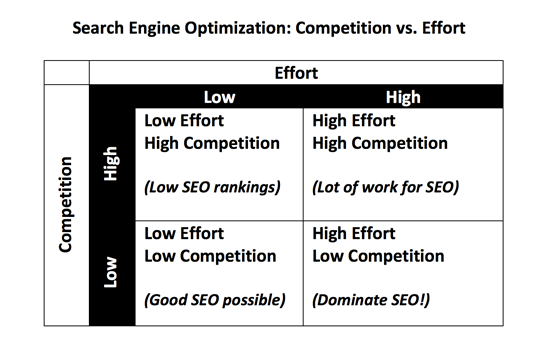 As you probably know, one of the things that we focus on here at Customer Paradigm is search engine optimization (SEO). I’m ranked on the Moz.com site (the top SEO resource blog out there) as one of the top 100 contributors, out of 350,000 contributors worldwide. As you probably know, one of the things that we focus on here at Customer Paradigm is search engine optimization (SEO). I’m ranked on the Moz.com site (the top SEO resource blog out there) as one of the top 100 contributors, out of 350,000 contributors worldwide.
One of the questions that I’m asked many times each week is, “How difficult will it be to get great rankings for my (fill_in_the_blank) site?”
The answer, of course, is that it really depends on two factors: competition and effort.
Effort vs. Competition
Unfortunately, equal effort does not always mean equal results.
Imagine rolling a bowling ball down a freshly waxed and polished lane. With skill and practice, you’re likely to get a strike and knock down all of the pins. At least some of the time.
But now imaging rolling that same bowling ball down a lane that is coated in half a foot of molasses. The same amount of force applied to the ball is not going to yield the same results.
Likewise, if the keyword results you’re trying to rank for are highly competitive, it’s going to take a LOT of effort to get the ball even close to the pins at the other end of our metaphorical bowling alley.
Why are some keyword terms competitive?
It’s because the type of traffic that a search yields can translate to a high volume of targeted traffic, who might buy your product. Or it may be a narrow, niche business-to-business term, but could lead to a $100k sale or more.
If you’re searching for “transmission repair,” for example, that probably means you’re having a really bad day because your car won’t move out of a parking spot. But to a transmission repair place, your locally-focused search might be worth several thousand dollars.
When we look at a search engine optimization project, we look at the competition vs. effort, to see how effective our efforts might be.
I went back to my political science studies, and broke it out into a two by two matrix:

1. High Competition, Low Effort.
In a highly competitive space, some of the top ranking sites may be spending $50,000+ per month to rank in the first few results of Google.
Ranking for these types of terms, though, can pay off in a high volume of search traffic, and subsequent buyers.
Here’s the math, based on a few assumptions:
- 500,000 searches for a competitive term per month
- x 11% clickthrough rate for top position
- = 55,000 visitors for that search term per month
- x 2% conversion rate
- @ average order of $50
- = $55,000 in revenue per month for ranking for that search term
But if you spend 2-3 hours a month working on it, perhaps you’ll move from page 35 up to page 23. So really, why bother? After the first page, virtually nobody will look at your site.
My recommendation: refocus your keywords on less competitive terms, so that you can achieve results. Or decide to spend a bit more effort.
2. High Competition, High Effort.
If you’re going after a highly competitive space, and you want to spend a lot of time and energy, you’ll see results.
But it could take a while.
You’re going to have to overcome entrenched sites that have years of successful inbound links, great content, and amazing site traffic.
Success will be defined by really small changes to the site, such as shaving 1/10 of a second off of your page load time, or decreasing your bounce rate by 4% on a specific page.
One of the top ranking pages on the Customer Paradigm site has 12,000 words of content, 100+ screenshots and a 47 minute video. It’s need to know information and in a crazy way, people watch the entire video and then call us to help them. I spent more than a week writing that page, but it dominates in a highly competitive space.
My recommendation: In a highly competitive space, there’s no easy way to knock others out of the rankings. It’s going to take a lot of work.
3. Low Competition, Low Effort.
If you target an area that doesn’t have a lot of competition, it’s easy to do a minimum amount of work, write a few pages of content, and get a couple of easy low-Page Authority links to your site.
With 300-500 words of content, your pages will rank well, because nobody else is devoting even this much effort to the space.
And you’ll probably do well in rankings. At least until someone new who is Web savvy comes into the space and starts doing things better.
My recommendation: Find a few areas like this that are easy to rank for, and spend time each month working on new pages. In an industry that isn’t very competitive, this is a good way to increase your rankings.
4. Low Competition, High Effort.
This is the sweet spot.
This is the metaphorical equivalent to taking that bowling ball and shooting it out of a canon.
If you spend a lot of time creating content, developing inbound links and making sure your on-site metrics show users like your site, you’re going to dominate the space.
It’s the equivalent of an NFL team showing up to play against a small high school team. There’s not even a question as to the outcome. The NFL team will dominate, and the other team might just lose it’s way.
Here’s the good news. While sometimes it’s tough to rank for top search results that are highly competitive, there are often many terms that are less competitive but allow you to compete.
Second, bigger companies tend to be more cautious about what they say online. For example, I’ve seen committees try to decide the 5 official tweets that the company will broadcast over the next month. So it’s often easy for a smaller, nimble organization to often do well from a search perspective – because they can create content easily and in volume for the site.
Let me know if you’d like to discuss SEO for your site…
Thanks,

Jeff Finkelstein
Founder, Customer Paradigm
303.473.4400
Connect Via Facebook >>
Connect Via Google+ >>
Connect Via Linked In >>
Connect Via Twitter >>
We love referrals! Our Referral Promise >> |